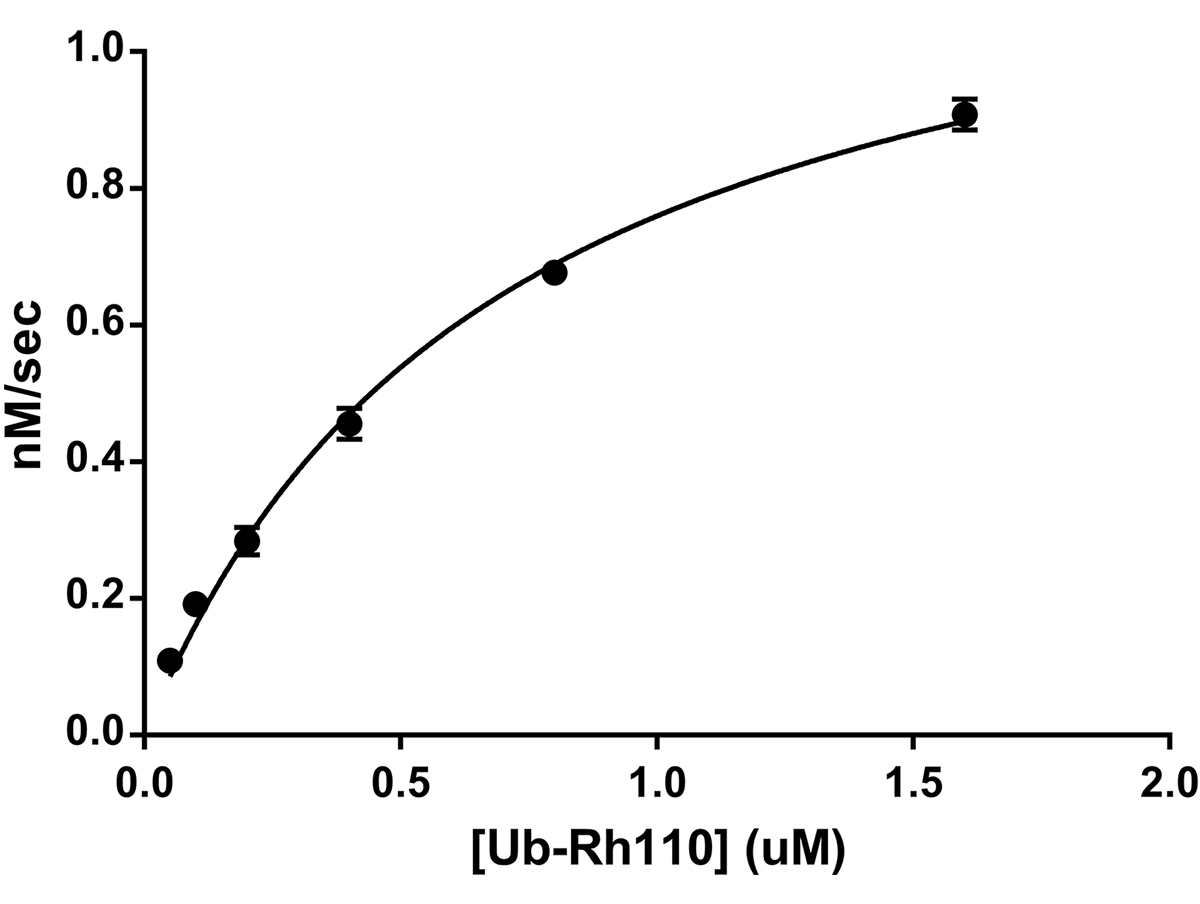
Michaelis-Menten Kinetics: Ubiquitin Rhodamine 110 serially diluted from 1.6 to 0.05microM was digested with 30pM UcHL3 over time. The assay was carried out in a reaction buffer of 50mM HEPES pH 7.5, 100mM NaCl, 1mM TCEP, 0.1mg/ml BSA, at 25°C. Initial
UcH-L3 (human) (rec.) (untagged)
SBB-DE0023
Protein IDP15374
Product group Proteins / Signaling Molecules
Overview
- SupplierSouth Bay Bio
- Product NameUcH-L3 (human) (rec.) (untagged)
- Delivery Days Customer2
- CertificationResearch Use Only
- Estimated Purity>95%
- Gene ID7347
- Target nameUCHL3
- Target descriptionubiquitin C-terminal hydrolase L3
- Target synonymsUCH-L3, ubiquitin carboxyl-terminal hydrolase isozyme L3, testicular tissue protein Li 221, ubiquitin carboxyl-terminal esterase L3 (ubiquitin thiolesterase), ubiquitin thioesterase L3, ubiquitin thiolesterase
- Protein IDP15374
- Protein NameUbiquitin carboxyl-terminal hydrolase isozyme L3
- Scientific DescriptionProtein. Human UcH-L3 (aa 1-230)is untagged. Source: E. coli. Formulation: Liquid. In 50mM HEPES pH 7.5, 100mM sodium chloride, 1mM TCEP. Purity: >95% (SDS-PAGE). UCHL3 (Ubiquitin C-terminal Hydrolase L3) is a deubiquitinating enzyme (DUB) that controls levels of cellular ubiquitin through processing of ubiquitin precursors and ubiquitinated proteins. It is a thiol protease that recognizes and hydrolyzes a peptide bond at the C-terminal glycine of either ubiquitin or NEDD8. It plays a role in regulating apical membrane recycling and indirectly increases the phosphorylation of IGFIR, AKT and FOXO1 and promotes insulin-signaling and insulin-induced adipogenesis. It is required for stress-response in retinal, skeletal muscle and germ cell maintenance. UCHL3 is also known to hydrolyze UBB(+1), a mutated form of ubiquitin which is not effectively degraded by the proteasome and is associated with neurogenerative disorders. It digests precursors and ubiquitinated proteins to generate monomeric ubiquitin. - UCHL3 (Ubiquitin C-terminal Hydrolase L3) is a deubiquitinating enzyme (DUB) that controls levels of cellular ubiquitin through processing of ubiquitin precursors and ubiquitinated proteins. It is a thiol protease that recognizes and hydrolyzes a peptide bond at the C-terminal glycine of either ubiquitin or NEDD8. It plays a role in regulating apical membrane recycling and indirectly increases the phosphorylation of IGFIR, AKT and FOXO1 and promotes insulin-signaling and insulin-induced adipogenesis. It is required for stress-response in retinal, skeletal muscle and germ cell maintenance. UCHL3 is also known to hydrolyze UBB(+1), a mutated form of ubiquitin which is not effectively degraded by the proteasome and is associated with neurogenerative disorders. It digests precursors and ubiquitinated proteins to generate monomeric ubiquitin.
- Storage Instruction-80°C
- UNSPSC41116100
- SpeciesHuman

